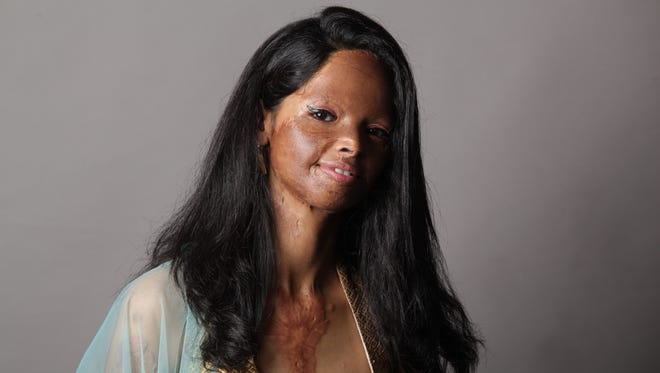Acid attacks against women in India on the rise; survivors fight back

NEW DELHI — In early July, unidentified men threw acid on a 35-year-old woman while she was staying at a government-run women's hostel in Lucknow, 330 miles southeast of here.
Guards came to her rescue, but the attackers fled. The assault on the woman, a gang-rape victim whose first name is Vimla, is the latest in a series of acid attacks that included two men forcing her to drink acid in March. USA TODAY does not use the full names of sexual assault victims to protect their privacy.
India has made international headlines for horrific rape cases in recent years, but acid attacks are common, too, although they receive less attention.
There are 250 to 300 acid attacks reported in India every year, despite laws restricting the sale of acid or other deadly chemicals, according to Stop Acid Attacks, a non-profit group.
Vimla "is a mysterious but tragic case of a woman being attacked repeatedly with acid," said Asish Shukla of Stop Acid Attacks, which also runs a chain of cafes called "Sheroes Hangout Cafe," managed by acid attack survivors like Vimla.
Shukla said the group has demanded that India's Central Bureau of Investigation to examine her case. "We are worried why she is attacked again and again over a long period," Shukla said.
Dibyaloke Rai Chaudhuri, a coordinator at Acid Survivor Foundation India, said Vimla's attackers targeted her repeatedly so she would be frightened into withdrawing the charges against them. So far, she has not.
In 2016, India recorded 300 attacks but many go unreported, so the actual number could exceed 1,000, according to Acid Survivors' Trust International based in the United Kingdom.

Other crimes against women in India are on the rise. Rapes in the capital region here increased 277%, from 572 in 2011 to 2,155 in 2016, according to Delhi police
Laws against rape were made stricter after a notorious 2012 Delhi gang rape in which five men and a juvenile brutalized a 23-year-old woman on a bus. She was dumped on a road and died two weeks later, sparking national outrage and protests.
Since 2013, acid attacks are an offense, punishable by up to 10 years in prison. Prior to that, no law dealt specifically with acid attacks.
"Acid is still sold openly in some parts of India, and it is easily available to the offenders. We have gathered videos of the acid being sold even after the restrictions, but it evoked no action," said Laxmi Agarwal, a victim who is now one of the most recognizable people in India fighting the assaults.
Agarwal was attacked in April 2005 at age 16 by someone who stalked her for months, demanding that she marry him.
"I remember the day in New Delhi near Khan Market when this guy and his brother's girlfriend together attacked me in the heart of the city. I lay writhing in pain and was hit by vehicles as I was blinded for a while," said Agarwal, who is married to social activist Alok Dixit, the founder of Stop Acid Attack.
"I looked at my face months after the attack in a mirror and shuddered. I wanted to be a singer and had been taking lessons to be able to participate in a reality show without the knowledge of my parents," Laxmi said.
"Those days I felt all my dreams had ended. But I think the attacker was defeated as he failed to crush my dream," she added.
Laxmi, now a mother of a 2-year-old girl and a TED Talk speaker, said more victims are filing police complaints than in the past.
"Acid attacks destroy a family completely, and the victim has to undergo at least 80 reconstruction operations. It is harrowing," she said.
Laxmi, who became a face of Viva N Diva, an apparel brand that wanted to send a social message by signing her for modeling, said rehabilitation of victims is most important since the attacker's aim is to kill a woman's aspiration to live a life of her choice.
The Rights of Persons with Disabilities Act was revised in 2016 to include acid attack survivors as physically disabled. That provides access to education and employment, with 3% of government jobs reserved for acid attack victims.
Activists and victims say the attacks will continue if the country does not treat the attackers more harshly and the victims more generously.

"The law only recognizes those victims who have been blinded by the acid attacks. Many victims have other kind of disfigurement. Nothing is classified separately in the new law," said Chaudhuri with the Acid Survivor Foundation.
Read more:
Why acid attacks are on the rise in Britain
Acid attack survivors redefine beauty in Bangladesh fashion show
"Conviction rates are very low in India, and so it does not act as a deterrent. The attackers also get bail easily," he said.
According to Laxmi, the crux of the problem in India "is the way the boys are raised. ... They are taught from the childhood that they are superior to women."
"It is a patriarchy mindset that is leading to such crimes," she said. "Even now the society here thinks a girl's dream is not a dream."